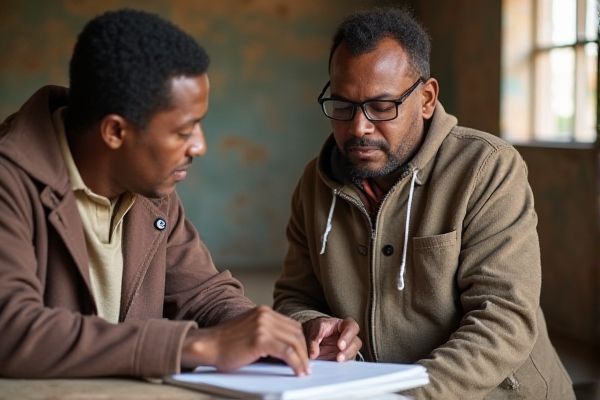
Ethiopia presents various opportunities in development aid roles, particularly in sectors such as education, health care, and agriculture. Organizations like the United Nations, non-governmental organizations (NGOs), and international donors actively seek skilled professionals to implement programs aimed at poverty alleviation and sustainable development. Positions often require expertise in project management, community engagement, and policy analysis, providing avenues for both local and international applicants. Networking through platforms like LinkedIn and attending relevant conferences can enhance your chances of securing a position in this dynamic field.
Job Description
Development aid jobs in Ethiopia offer diverse opportunities for professionals passionate about making a difference in the lives of communities. Positions often involve working with local and international organizations to implement programs focused on education, health, agriculture, and economic development. Candidates typically require skills in project management, strategic planning, and community engagement, with an emphasis on cultural competency in the Ethiopian context. Competitive salaries and benefits packages, including housing and relocation support, are common incentives to attract qualified individuals to this impactful sector.
Requirement
Development aid jobs in Ethiopia often require a background in international relations, social sciences, or a related field. Proficiency in local languages such as Amharic or Oromo can significantly enhance your employability and ability to communicate effectively with communities. Experience in project management, fundraising, or monitoring and evaluation is also highly valued by organizations operating in the country. Familiarity with the socio-political context and development challenges in Ethiopia will provide a strong foundation for successful contributions in this sector.
Salary and Perks Expected
Development aid jobs in Ethiopia typically offer competitive salaries that range from $20,000 to $60,000 annually, depending on the level of experience and specific role. Many organizations also provide additional perks, such as health insurance, housing allowances, and sometimes education benefits for children. Opportunities for professional development and training are common, enhancing your skills and career prospects. Working in Ethiopia not only allows you to contribute positively to local communities but also enriches your understanding of diverse cultures and societal needs.
Similar Job Names
- Project Manager
- Program Officer
- Monitoring and Evaluation Specialist
- Grant Coordinator
- Field Officer
- Community Development Specialist
- Health Program Coordinator
- Education Program Officer
- Livelihoods Officer
- Gender Specialist
- Data Analyst
- Capacity Building Advisor
- Finance Officer
- Logistics Coordinator
- Advocacy Officer
Job Expectation Concept
Development aid jobs in Ethiopia often require a deep understanding of local contexts, cultural nuances, and community needs. Your role may involve implementing projects that address poverty alleviation, education, healthcare, and sustainable agriculture. Collaboration with governmental and non-governmental organizations is essential to ensure that initiatives are effective and align with national goals. Being adaptable and culturally sensitive is crucial for building trust and fostering positive relationships with local populations.
Career Advantage and Weakness
Development aid jobs in Ethiopia offer significant career advantages, such as the opportunity to contribute to community development and improve living standards. Engaging with diverse cultures and working alongside local organizations can enhance your professional skills and broaden your global perspective. However, challenges include potential limitations in job security due to reliance on funding and fluctuating donor priorities, which may affect long-term project sustainability. Understanding the local political landscape is also crucial, as it can impact project implementation and overall effectiveness.
Important Thing Must Know
Development aid jobs in Ethiopia are essential for addressing the country's unique challenges, including poverty alleviation, education improvement, and healthcare access. Various organizations, including international NGOs and government agencies, constantly seek professionals with diverse skill sets, ranging from project management to community engagement. Familiarity with local cultures and languages can significantly enhance your effectiveness in these roles. Understanding the complex socio-political landscape in Ethiopia will aid in navigating the challenges of development work. Opportunities often arise in urban and rural settings, providing a chance to make a meaningful impact on communities.
Alternative Career Options
Exploring alternative career options in development aid jobs in Ethiopia can broaden your professional horizons. Positions in project management, community development, or agricultural development provide impactful opportunities to contribute to local improvement efforts. Roles in non-governmental organizations (NGOs) or international agencies can enhance your skills while addressing critical issues such as education, health, and economic growth. Engaging with local communities and leveraging partnerships can lead to sustainable change and empower you to make a significant difference in people's lives.
Companies List
- World Vision Ethiopia
- Mercy Corps Ethiopia
- Oxfam Ethiopia
- Save the Children Ethiopia
- United Nations Development Programme (UNDP) Ethiopia
- International Rescue Committee (IRC) Ethiopia
- Action Against Hunger Ethiopia
- Plan International Ethiopia
- Ethiopian Red Cross Society
- CARE Ethiopia
List of Ideal City
Ethiopia boasts several cities that are ideal for development aid jobs, with Addis Ababa being the central hub for international organizations and NGOs. Organizations such as the United Nations and various non-profits frequently base their operations in the capital, offering numerous opportunities for professionals in the sector. Jimma and Bahir Dar also present attractive options, with projects focused on agriculture, education, and health, providing a strong community impact. Engaging in these regions allows you to contribute meaningfully while experiencing Ethiopia's rich culture and diverse landscapes.
 jobs-ethiopia.com
jobs-ethiopia.com